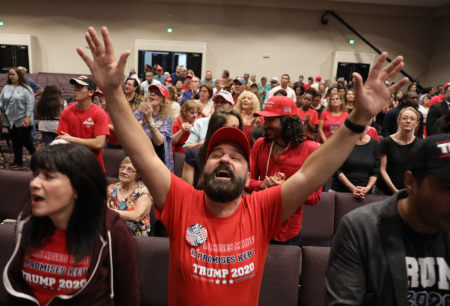Republicans ‘significantly higher’ on Bible engagement than Democrats, independents: study

Registered Republicans have "significantly higher" rates of Bible engagement than Democrats or independents, according to a report by the Barna Group and the American Bible Society.
In their newly released “State of the Bible 2020” report, the researchers measured what they called “Scripture Engagement,” which centered on how often a person not only reads the Bible, but how it influences their relationships and decisions.
From there, the researchers developed a score going from 115 or higher, which was labeled “Bible-Centered,” to 70 or below, which was labeled “Bible Disengaged.”
The report found that Republicans scored higher than Democrats or independents, with respondents who identified as belonging to the GOP as averaging 80 on the scale.
According to ABS and Barna, this means that Republicans tended to be “Bible Neutral,” defined as people who “interact with the Bible sporadically with little influence from the Bible.”
“Nine of ten read the Bible either once a month (36.2%), three or four times a year (22.8%), or once or twice a year (31.6%),” they explained.
By contrast, Democratic respondents scored an average of 69 and independents scored an average of 66, putting both of them in the “Bible Disengaged” category.
“Bible Disengaged people interact with the Bible infrequently, if at all, and it has a minimal impact on their lives,” explained the researchers.
“Two thirds (66.3%) never read the Bible on their own, and three in ten (30.1%) read it only once or twice a year. As a group, Bible Disengaged people rarely seek out the Bible, tending to encounter it through others, rather than by choice.”
Despite the different categories for averages, “Bible Disengaged” was the most common category, with 47% of Democrats and 35% of Republicans garnering that score range.
By contrast, only 10% of Republicans, 4% of Democrats, 3% of Independents, and 3% of unregistered respondents ended up with scores placing them in the “Bible Centered” category.
The report also found that a majority of those in the “Bible Centered” category stated that the Bible had a lot of influence on their political party affiliation, regardless of party registration.
“Nearly nine out of ten Bible Centered respondents (88%) agree (15.7% agree, 21.3% strongly agree, 50.6% very strongly agree) that the Bible has a lot of influence on their political party affiliation,” noted the researchers.
“Fascinatingly, these results do not vary significantly by political identity. Bible Engaged and Bible Centered Republicans, Democrats, and Independents agree with this statement approximately equally.”
Data for the study drew from an online survey of 1,010 U.S. adults taken Jan. 2-13 and a telephone survey of 1,000 U.S. adults taken Jan. 8 – Feb. 11, both with a margin of error of plus or minus 3.1 percentage points.
Other findings show that 71.8% Bible Centered and 65.7% Bible Engaged adults agree that the Bible encourages them to personally participate in civic and government issues; 73.5% of Bible Centered and 63.1% of Bible Engaged respondents also believe the Bible encourages submitting to government leaders.
The report also found that the more biblically engaged a person was, the more likely they were to conclude that the Bible leads them to welcome immigrants, have interracial friendships, and care for the environment.
"Bible Centered respondents would typically respond that they strongly agree with each of these statements. In other words, the data suggest that Bible engaged Americans really do practice the Golden Rule," stated the report.
In recent times, much has been made about the growing religious gap between Democrats and Republicans, with the former seeing a greater increase in religious unaffiliated members.
The Pew Research Center released a report in June which found that from 2009-2018, the percentage of Democratic voters who identified as Christian had dropped from 73% to 52%.
The same Pew report also saw a drop among Republican voters who identified as Christian, decreasing from 87% in 2008 to 79% in 2019.
Meanwhile, the number of Democratic voters that identified as religious unaffiliated more than doubled during the same time period, going from 18% in 2008 to 38% in 2019.
“The U.S. religious landscape has undergone profound changes in recent years, with the share of Christians in the population continuing to decline,” stated Pew at the time. “These shifts are reflected in the composition of the partisan coalitions.”





















